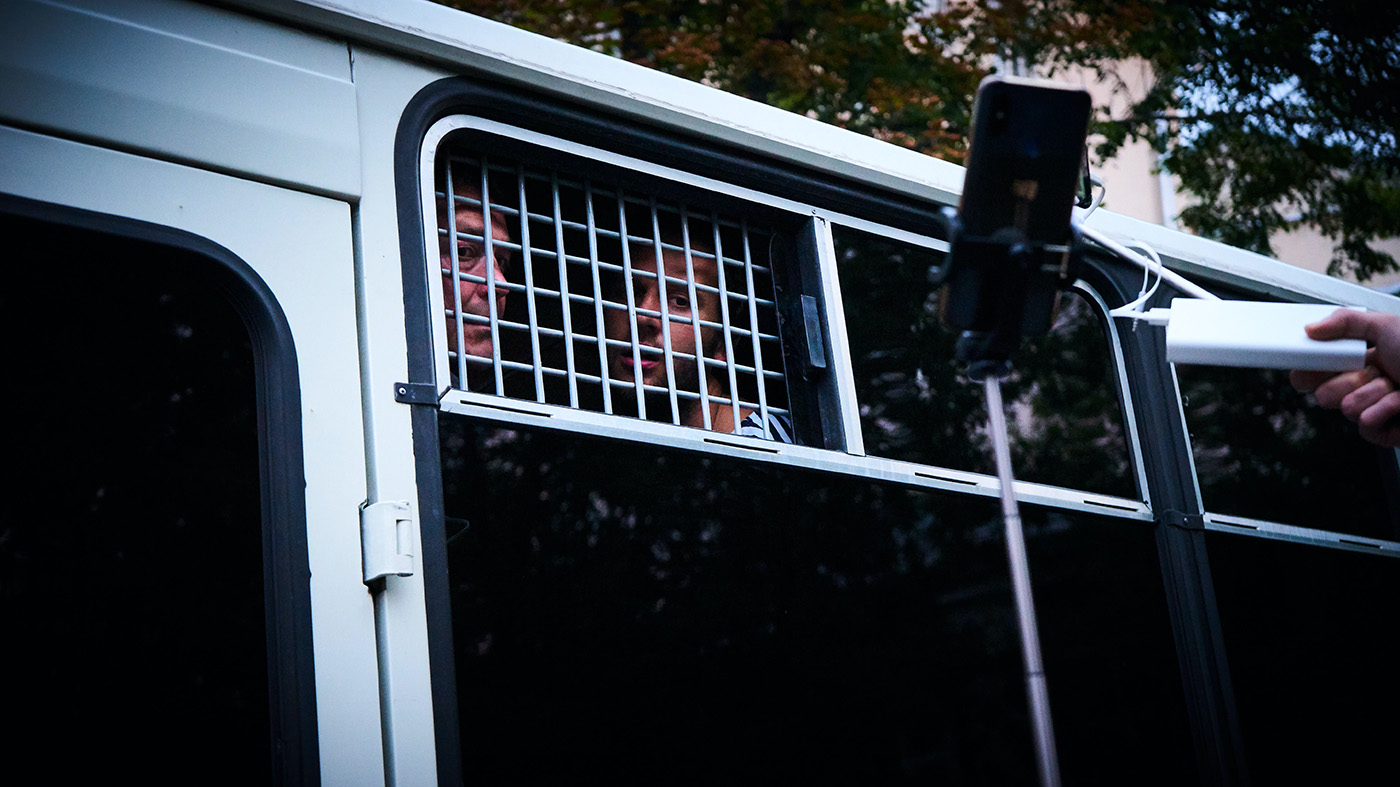Navalny, “Nationalism”, and Never‑Ending Reflexive Control
How the Kremlin Undermines Western Solidarity with the Russian Opposition Using the Left
By Anton Shekhovtsov February 06, 2021

How the Kremlin Undermines Western Solidarity with the Russian Opposition Using the Left
By Anton Shekhovtsov February 06, 2021

How the Kremlin Undermines Western Solidarity with the Russian Opposition Using the Left.
Imagine a scenario where two policemen catch a known rapist‑killer. As they are about to handcuff him, he says: “I just saw a guy around the corner who jaywalked two days ago putting three cars at risk of crashing. Perhaps you could arrest him”. The policemen forget the task at hand and start discussing whether they should go after the jaywalker. As the discussion heats up, they forget about the rapist‑killer, who simply walks away.
In political warfare, the trick used by the rapist‑killer in this scenario is called “reflexive control”. It involves conveying particular information to an adversary in order to induce that adversary to voluntarily make a specific decision to their own detriment. Most often, reflexive control is about confusing an adversary, clouding his thinking and making a wrong decision.
The two policemen in our story lose track of a critical and time‑sensitive priority—arresting and neutralizing a grave offender. Not veering off into a discussion about whether the jaywalker was real or imagined, whether he deserved to be arrested or not.
The current attacks against Russian opposition leader Alexey Navalny alleging his nationalistic leanings bear all the traditional markings of a reflexive control operation initiated by the Kremlin. Their goal is to undermine the legitimacy of Navalny in the eyes of the West and paralyze action in his support.
I am unable to shake off a strong feeling of a déjà vu with tragic events that took place seven years ago. As the Kremlin unleashed its invasion of Ukraine, it has successfully crowded the Western media space with anti‑Ukrainian narratives in order to undermine Western support for Ukraine. The leitmotif of this campaign portrayed the Maidan revolution as an ultranationalist putsch that resulted in the rise of an ultranationalist government.
In February‑March 2014, as the Russian green men establish a blockade of Ukrainian military bases in Crimea and occupy administrative buildings; and as Russia annexes Crimea, in gross violation of a number of international treaties,—a significant bulk of the Western media discourse is evaluating whether the Maidan revolution was instigated by ultranationalists.
The Kremlin’s ultimate goal was not to convince the West that Kyiv was run by a fascist junta. Rather, it sought to distract Western attention from Moscow’s criminal actions and to shift the focus of Western decision‑makers to an entirely different issue, whose importance and time‑sensitivity was disproportionately low compared to the Kremlin’s gross violation of international norms and post‑war order. Putin has successfully executed a reflexive control operation as part of a 4D approach to managing the aggression against Ukraine internationally: dismiss, distort, distract, dismay. Dismiss the fact of occupation of Crimea by Russian troops, distort the general picture of the situation in Ukraine with the use of disinformation, distract Western attention from the Kremlin’s activities by launching accusations elsewhere, and dismay Western audiences by scaring them with Russia’s unpredictable behaviour.
In the case of Alexey Navalny, the Kremlin’s method is similar.
Over the years, Navalny has published a series of shocking investigations into the mind‑boggling corruption of Russian kleptocratic elites. The investigations were highly damaging to Putin’s reputation. Navalny continued his investigative work despite the intimidation by criminal cases fabricated by the Kremlin against him.
Switching its approach, the Kremlin decided to kill Navalny with a Novichok nerve agent, in violation of the national law, all democratic norms, and the international Chemical Weapons Convention.
Miraculously, Navalny survived the assassination attempt and returned home from Germany, where doctors treated him after the poisoning. Upon his arrival to Russia, he was immediately arrested and jailed.
The European Parliament has responded by adopting two resolutions related to Navalny, one strongly condemning his attempted assassination, the other calling for his immediate and unconditional release. In October 2020, while Navalny was still recovering from the poisoning in Germany, the EU introduced sanctions against top Russian officials and a number of entities involved in his assassination attempt.
Moscow’s 4D approach to eroding the European solidarity on the Navalny case has been the following: dismiss accusations of poisoning the leading opposition figure, distort the circumstances surrounding Navalny’s poisoning by suggesting multiple theories of his sickness, distract European attention from Navalny’s attempted assassination sanctioned by the Kremlin, and dismay European politicians by expelling diplomats for supporting the jailed opposition activist.
The “mechanics” of the “distract” element consist of a reflexive control operation involving three phases. First, the Kremlin conveys the narrative (“Navalny is a nationalist”) privately to its agents of influence and publicly via state‑controlled media (such as RT) setting up the agenda. Second, Russian “leftists” reproduce the sanctioned narrative in Western national and international left‑wing media. Third, the narrative “travels” to more moderate, centrist media space and becomes part of the mainstream discussion, which is Moscow’s main goal of the “distract” element. By “laundering” this reflexive control operation through Russian “leftists”, the Kremlin partially removes traces of its influence in “Navalny’s nationalism” debates among Western left‑wing commentators and activists.
Unsurprisingly, Russian mediators between the Kremlin and the Western left feature the very same personalities who advanced Moscow’s anti‑Ukrainian campaign.
One egregious specimen is Alexey Sakhnin, a member of the Russian organisation “Left Front”. Introduced to Western left‑wing audiences as an opponent to Putin, Sakhnin has been continuously involved in the Kremlin’s information war against Ukraine since 2014, as well as in several operations aimed at smearing and discrediting European experts and politicians critical of Putin’s regime. While living “in exile” in Sweden in 2012–2019, Sakhnin was busy packing Sweden’s Left Party and Green Party with pro‑Kremlin narratives packaged as genuine left‑wing analysis of international relations. Upon his return to Russia, he became a regular commentator for the Russian once leading financial newspaper Vedomosti: shortly before Sakhnin started writing for it, Vedomosti had been sold to businessmen loyal to the Kremlin who needed new authors after the newspaper’s senior staff departed in protest to the loss of editorial independence. Today, as part of the Kremlin’s reflexive control operation against Navalny, Sakhnin is targeting left‑wing circles not only in Sweden, but also in Norway and internationally. While it may be Sakhnin’s and other Russian “left‑wing” contacts’ objective to convince Western left‑wing activists and commentators of Navalny’s nationalist political sentiments, it is only an intermediate and not even necessary objective for the Kremlin. With its reflexive control operation against Navalny, Moscow’s ultimate goal is to elevate an irrelevant debate into prominence, undermine Western solidarity with the Russian opposition and let the murderous kleptocratic regime get away with the very real crimes infinitely worse than Navalny’s presumed nationalism.
Over the last several months, harassment of Russia’s political opposition has intensified, with legislative elections as a clear cause. Many people have erroneously believed that once the elections were over, the repressions would ease, if not entirely disappear.
By Fedor Krasheninnikov
October 11, 2021
 Article
Article 2021 saw widespread political repressions across Russia
By Anton Mikhalchuk
August 27, 2021
 Article
Article On July 12, 2021, yet another amendment to the legislation on Undesirable NGOs entered into force in Russia. The changes mean that now anyone who works with an “undesirable” organization can be subject to administrative penalties
By Olga Gnezdilova
July 21, 2021

Over the last several months, harassment of Russia’s political opposition has intensified, with legislative elections as a clear cause. Many people have erroneously believed that once the elections were over, the repressions would ease, if not entirely disappear.
By Fedor Krasheninnikov
October 11, 2021
 Article
Article 2021 saw widespread political repressions across Russia
By Anton Mikhalchuk
August 27, 2021
 Article
Article On July 12, 2021, yet another amendment to the legislation on Undesirable NGOs entered into force in Russia. The changes mean that now anyone who works with an “undesirable” organization can be subject to administrative penalties
By Olga Gnezdilova
July 21, 2021
